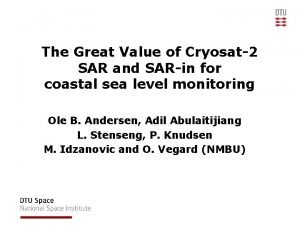EVAR Planning Keys to Success Shawn Sarin MD




























- Slides: 28

EVAR Planning: Keys to Success Shawn Sarin, MD Vascular and Interventional Radiology The George Washington University Medical Center

Shawn N. Sarin, MD I/we have no real or apparent conflicts of interest to report. Off-Label: Some peripheral intervention devices are off-label.

Planning • Not all patients are candidates for EVAR – Choose the right patients – Patient characteristics and aneurysm anatomy – Only 60% ideal for EVAR based on anatomy • Preprocedural imaging is paramount • Detailed imaging of the aorta – From descending thoracic to common femorals – Nice to know the runoff as well

Pre Procedure Imaging • CTA – 3 D Workstation • MRA • Angiography • IVUS

Develop a Systematic Approach • Visceral and Renal arteries • Proximal Neck Anatomy • Proximal Seal Zone • Distal Neck Anatomy • Distal Seal Zone – CIA/EIA • Access Arteries – CFA/EIA

Visceral and Renal Arteries • Assess patency of Celiac, SMA and IMA • Renal Arteries – Position • In relation to neck • Which is lowest? – Patency – Number

Diameter of Proximal Neck • Measure at the lowest renal and 10 -15 mm below the lowest renal

Measurements • Axial measurements can overestimate due to angulation and tortuosity • Measure diameter perpendicular to central vessel axis

Device Sizing • Oversize neck by 10 -20% – Look at vendor sizing chart • Current devices range from 20 -36 mm and can treat aortic neck diameters from 19 -32 mm • Remember: – Undersized graft may have no seal – Oversized graft may have pleats/folds

Length of Proximal Neck • Need to create a seal between the endograft and the aortic wall • 10 -15 mm length

Contour of Proximal Neck • Change in neck size of >10 -15% over its length associated with higher proximal endoleak rate Straight Tapered Reverse Tapered

Quality of Proximal Neck • Calcification • Mural Thrombus • Angulation – Greater than 90 degrees is a risk factor for an endoleak • Extensive calcification increases probability of stent migration

Angulation of Proximal Neck • • Often seen with larger aneurysms Mild <40° Moderate 40 -60° Severe >60°

Tips and Tricks • Assess angulation on preprocedure imaging will help during procedure and optimize endograft placement • Place endograft as close to lowest renal as possible

Craniocaudal Angulation • Most infrarenal necks have 5 -15° cranial angulation

LAO/RAO Angulation • Determine LAO/RAO angulation based on lowest renal

LAO/RAO Angulation • Determine LAO/RAO angulation based on lowest renal


Iliac Arteries • Common/External Iliacs are the location of distal seal • Are they aneurysmal? – rare for EIA to be aneurysmal – consider coiling of IIA when extending to EIA • Distal seal zone: – 10 -15 mm – Oversize 10 -20%

Iliac Arteries

Iliac Arteries • Ideally – Larger than 6 mm – Non calcified – Non tortuous • Newer devices are lower profile and hydrophilic

Graft Selection • Fixation Type – Positive fixation (hooks, barbs) – Radial force, friction – Column support • Sizes • Anatomy • Delivery System – Flexibility – Trackability – OD of delivery system

Graft Selection

Endurant Endologix GORE COOK Proximal neck length 10 mm 15 15 15 neck diameter 19 -32 18 -32 mm 19 -29 mm (inner to inner) 18 -32 mm infrarenal angle <60 <60 access 6. 5 mm/17 18 fr OD 6. 5 mm/17 fr ID/8 12 fr/18 fr/20 fr fr. contralateral 5 mm/6. 8 mm/7. 6 mm 18, 20 and 22 fr OD min access profile (28 mm graft) 20 F OD 19. 2 F OD 23. 1 F OD/18 F OD (LP) 20. 4 F OD

Access Selection • Anatomic factors • Vascular access – Femoral cutdown – Percutaneous

Anesthesia Considerations • General Anesthesia • Regional: – Lumbar – Spinal • Conscious Sediation

Take Home Points • Not all patients are ideal for EVAR as of 2/24/13 • Work in a team • Need a quality pre procedure imaging (CTA) – Helps decide if patient is an EVAR candidate – Device sizing and selection – Aids in intraprocedural planning • Planning will become more important in the future

Thank you! ssarin@gwu. edu
 Shawn sarin
Shawn sarin Elijah kirtland temple
Elijah kirtland temple Keys to literacy keys to content writing
Keys to literacy keys to content writing 7 keys project management
7 keys project management Three keys to success in engineering study
Three keys to success in engineering study Varices esofagicas clasificacion endoscopica
Varices esofagicas clasificacion endoscopica Your child's success or lack of success
Your child's success or lack of success Your child's success or lack of success
Your child's success or lack of success Shawn winkleman
Shawn winkleman Alan shawn feinstein middle school
Alan shawn feinstein middle school Stephanie shawn
Stephanie shawn Gabriel mpubani
Gabriel mpubani Iec standards
Iec standards Shawn andres
Shawn andres Shodanhq.com
Shodanhq.com Arduino leonardo lcd
Arduino leonardo lcd Lexy shawn
Lexy shawn Shawn malhotra
Shawn malhotra Al shawn jeffery
Al shawn jeffery Shawn lupoli
Shawn lupoli Shawn lupoli
Shawn lupoli Shawn beightol
Shawn beightol Jeff beier
Jeff beier Shock mnemonic
Shock mnemonic Shawn ralston
Shawn ralston Benefits of mrcp degree
Benefits of mrcp degree Dr lorraine johnstone
Dr lorraine johnstone Rio americano basketball
Rio americano basketball Shawn ying
Shawn ying




















































